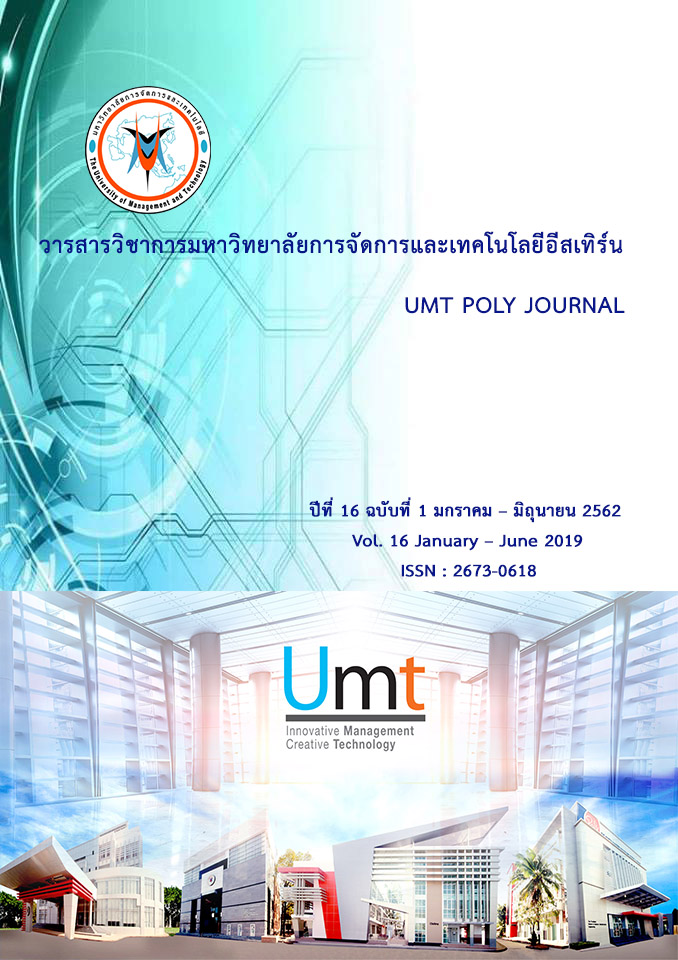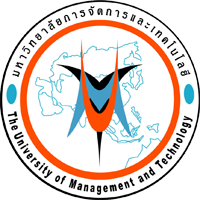ปัจจัยที่มีความสัมพันธ์กับความฉลาดทางสังคมของนักศึกษาพยาบาล
คำสำคัญ:
ความฉลาดทางสังคม, สัมพันธภาพระหว่างบุคคล, รูปแบบการเผชิญปัญหา, นักศึกษาพยาบาลบทคัดย่อ
การวิจัยเชิงพรรณนาหาความสัมพันธ์ครั้งนี้ มีวัตถุประสงค์เพื่อศึกษา 1) ความสัมพันธ์ระหว่างผลสัมฤทธิ์ทางการเรียน 2) รูปแบบการเผชิญปัญหา 3) ความสามารถในการปรับตัวด้านการเรียน 4) สัมพันธภาพระหว่างบุคคล และ 5)บรรยากาศการเรียนการสอน กับความฉลาดทางสังคมของนักศึกษาพยาบาล กลุ่มตัวอย่างเป็นนักศึกษาพยาบาล ชั้นปีที่ 1-4 จำนวน 120 ราย ได้มาโดยการสุ่มตัวอย่างแบบแบ่งชั้น เก็บข้อมูลโดยใช้ แบบบันทึกข้อมูลส่วนบุคคล แบบวัดความฉลาดทางสังคม แบบสอบถามรูปแบบการเผชิญปัญหา แบบสอบถามความสามารถในการปรับตัวด้านการเรียน แบบสอบถามสัมพันธภาพระหว่างบุคคล และแบบสอบถามบรรยากาศการเรียนการสอน ซึ่งมีค่าความเชื่อมั่นของเครื่องมือ ได้แก่ .82, .76, .80, .91 และ .90 ตามลำดับ วิเคราะห์ข้อมูลโดยใช้สถิติเชิงพรรณนาและหาความสัมพันธ์ด้วยสถิติ Pearson’s Product Moment Correlation
ผลการวิจัยพบว่า คะแนนเฉลี่ยความฉลาดทางสังคมโดยรวมของนักศึกษาพยาบาลกลุ่มตัวอย่าง เท่ากับ 105.09 (SD = 9.49) อยู่ในระดับปานกลาง ความสามารถในการปรับตัวด้านการเรียน รูปแบบการเผชิญปัญหา สัมพันธภาพระหว่างบุคคล และบรรยากาศการเรียนการสอน มีความสัมพันธ์ทางบวกกับความฉลาดทางสังคมของนักศึกษาพยาบาล อย่างมีนัยสำคัญทางสถิติที่ระดับ .01 (r = .593, .572, .562 และ .218 ตามลำดับ) ส่วนผลสัมฤทธิ์ทางการเรียนไม่มีความสัมพันธ์กับความฉลาดทางสังคมของนักศึกษาพยาบาล อย่างมีนัยสำคัญทางสถิติ ผลการวิจัยครั้งนี้สามารถเป็นข้อมูลพื้นฐานสำหรับผู้บริหารสถานศึกษาและคณาจารย์ในการพัฒนารูปแบบการเสริมสร้างความฉลาดทางสังคมของนักศึกษาพยาบาล โดยเฉพาะการเสริมสร้างความสามารถในการปรับตัวด้านการเรียน รูปแบบการเผชิญปัญหา สัมพันธภาพระหว่างบุคคล และบรรยากาศการเรียนการสอน ให้แก่นักศึกษาพยาบาลต่อไป
Downloads
เอกสารอ้างอิง
Babu M, Sameer. (2007). Social Intelligence among Senior Secondary School Student: A Comparative Sketch. Retrieved September 23, 2016. From http://eric.ed.gov/?id=ED50048
Bandura Albert. (1989). Social Foundations of Thought and Action: A Social Cognitive Theory. New Jersey: Prentice – Hall.
Bar-On, R. (2005). The Bar-On model of emotional-social intelligence (ESI). Psicothema, 18, 13-25.
Chompunud, S. & Inkaew. (2012). Resilience quotient, emotional quotient and stress of the nursing students thai red cross college of nursing. Thai Red Cross Nursing Jouranl. 19(1), 1-16.
Chudech, S. & Iemworamate, W. (2002). Variables to predict mental health and adjustment of students at King Mongkut’s University of Technology Thonburi. KMUTT Research and Development Journal. 25(3), 215-232.
Department of Mental Health. (2011). Knowledge of mental health and psychiatric. Retrieved September 30, 2016. From http://www.klb.dmh.go.th
Gadre, S. (2004). Effect of School Climate on Social Intelligence. IFE Psychology, 12(1), 103-111
Ganie & Mudadir (2005). A Study of Social Intelligence & Academic Achievement of College Students of District Srinagar, J&K, India. Journal of American Science, 11(3), 23- 27.
Goleman, D. (2006). Social Intelligence. London : The Random House Group Limited.
Iamsupasit, S. (2000). Theories and techniques in behavior modification (4th ed.). Bangkok: CU Print.
Iruloh, N.B and Ukaegbu, M.H, (2015). Emotional, social, cognitive intelligence and social support network among youth. British Journal of physical research. 3(2), 35-41.
Kaewmart, S. (2013). Nursing students with depression. The Journal of Faculty of Nursing Burapha University. 21(3), 14-23..
Lazarus, R. S., & Folkman, S. (1984). Stress, appraisal, and coping. New York: Springer
Meijs, N., Cillessen, A. H., Scholte, R. H., Seger, E. & Spijkerman, R. (2010). Social Intelligence and Academic Achievement as Predictors of Adolescent Popularity. Journal of Youth Adolescence, 39(1), 62-72.
Noipayak, P. (2012). Social intelligence. Bankok: Lakluk Group CO., LTD.
Pattananurak, S. et al,. (2011). Factor affecting emotional quotient on academic achievement of the first year students in Western University Kanchanaburi. Retrieved March 10, 2016. From http://www.western.ac.th
Ruangpermpoon, K., Rongmuang, S., & Nintachan, P. (2011). Characteristics of Social Adjustment in Nursing Students. Ramathibodi Nursing Journal, 17(3), 478-942.
Saewikun, S. (2016). The Relationship Between Social Intelligence and Performance Effectivenessof Sale Staff in an Insurance Company. Retrieved October 12, 2015. From bus.rmutp.ac.th/research/myfile/2017-01-28-999-51.pdf.
Sangtonsrikamol, K. (2015). How to raise child smart, good, human relationship with SQ. Retrieved September 13, 2016. From https://www.gotoknow.org/posts/184898
Saxena & Jain (2013) Saxena, S and Jain, R.K. (2013). Social Intelligence of Undergraduate Students In Relation To Their Gender and Subject Stream , IOSR Journal of Research & Method in Education 1(1), 1-4.
Shutpongsawas, C. (2010). Selected factors affecting on learning adjustment of the first year students of Nakhonrachasima Rajabhat University (Unpubished master’s thesis). Nakhonrachasima Rajabhat University, Nakhonrachasima, Thailand.
Siman & Dogan (2013) Siman. F & Dogan. T. (2013). Social Intelligence as a Predictor of Loneliness in the Workplace. Spanish Journal of Psychology , 16(36), 1-6.
Sricamsuk Saito, A., Vorahar, W., & Senarak W. (2011). Happiness of Undergraduate Nursing Students, Faculty of Nursing, Khon Kaen University. Journal of Nursing Science and Health. 34(2), 70-79.
Srisatidnarakul, B. (2007). The Methodology in Nursing Research (4th ed.) Bangkok: U&I INTER MEDIA CO., LTD.
Suphamongkhon, N. (2004). Anxiety social support and coping strategies of university students (Unpubished master’s thesis). Chulalongkorn University, Bangkok, Thailand.
Suwitthayarat, K. (2014). The study and development of social intelligence for higher education student in south of Thailand (Unpubished master’s thesis). Srinakharinwirot University, Bankok, Thailand.
Tanakitkosate, A. (2015). Thinking quotient and self development. Retrieved October 12, 2017. From http://www.forest.go.th/psdg/index.php?optiom =com_ docman&Itemid=409&task=doc_download&gid=462&lang=en
Tanukul, S., & Promla, W. (2016). The perception of nurses in the overall performanceof nursing students Private University in Pathumthani Province. SSRU Graduate Students Journal.2(2), 440-444
The Registrar and Academic Evaluation Office, Boromarajonani College of Nursing Sunpasitiprasong. (2560)
Thitipanichayangkoon, T. (2007). Some factors affecting emotional stability and adversity quotient of matthayomsuksa III students in bangkok educational service area III (Unpubished master’s thesis). Srinakharinwirot University, Bankok, Thailand.
Tongsuebsai, K. (2009). Development of a social intelligence scale for undergraduate students. The faculty of education (Unpubished master’s thesis). Chulalongkorn University, Bangkok, Thailand.
Wongkumsin, T. (2558). Social Intelligence and Prosocial Behavior of Students of Faculty of SocialSciences at Kasetsart University. Journal of the Association of Researchers, 20(3), 87-98.
ดาวน์โหลด
เผยแพร่แล้ว
ฉบับ
ประเภทบทความ
สัญญาอนุญาต
ประกาศลิขสิทธิ์
เนื้อหาและข้อมูลในบทความที่ลงตีพิมพ์ในวารสารวิชาการมหาวิทยาลัยการจัดการและเทคโนโลยีอีสเทิร์น ถือเป็นข้อคิดเห็นและความรับผิดชอบของผู้เขียนบทความโดยตรง ซึ่งกองบรรณาธิการวารสารไม่จำเป็นต้องเห็นด้วยหรือร่วมรับผิดชอบใด ๆ
บทความ ข้อมูล เนื้อหาหรือรูปภาพ ฯลฯ ที่ได้รับการตีพิมพ์ในวารสารวิชาการมหาวิทยาลัยการจัดการและเทคโนโลยีอีสเทิร์น ถือเป็นลิขสิทธิ์ของวารสารวิชาการมหาวิทยาลัยการจัดการและเทคโนโลยีอีสเทิร์น หากบุคคลหรือหน่วยงานใดต้องการนำข้อมูลทั้งหมดหรือบางส่วนไปเผยแพร่ต่อหรือเพื่อกระทำการใด ๆ จะต้องได้รับอนุญาตเป็นลายลักษณ์อักษรจากวารสารวิชาการมหาวิทยาลัยการจัดการและเทคโนโลยีอีสเทิร์นก่อนเท่านั้น




